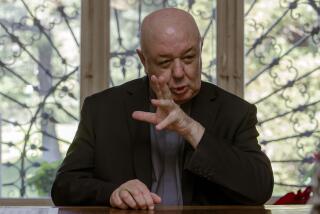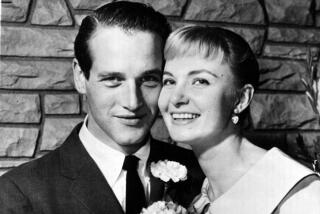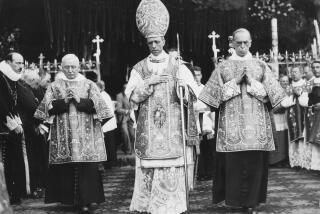Letters reveal Pope John Paul II’s intensely emotional relationship with a married woman
- Share via
reporting from ROME — Newly revealed letters written by Pope John Paul II show he had an intensely emotional relationship with a married woman that spanned more than 30 years.
In his letters to Polish-born American philosopher Anna-Teresa Tymieniecka, the Polish pontiff calls her a “gift from God.”
Although the letters do not suggest that John Paul, who became a saint in 2014, had a physical relationship, they show he was conflicted about his feelings for the mother of three.
In 2008, Tymieniecka sold hundreds of letters between her and John Paul to the National Library of Poland, which kept them from public view until it showed the BBC his letters to her.
The pair struck up a friendship in 1973 when Tymieniecka contacted the then-Cardinal Karol Wojtyla, who was archbishop of Krakow, about translating into English a book on philosophy he had written. Tymieniecka, then 50, had left her native Poland to settle in the U.S., where she was married to Harvard economist Hendrik Houthakker.
As she began to work with Wojtyla, she traveled to Poland to meet him and their relationship became closer. In a 1974 letter, he told her that her letters were “so meaningful and deeply personal.”
Although Tymieniecka, who died in 2014, sold their correspondence to the library, the BBC reported that only his letters to her have now been made available.
In 1976, two years before he was elected pope, Wojtyla visited Tymieniecka and her family at their home in New Hampshire, where the correspondence suggests she admitted having strong feelings for him. In letters written soon after, the future saint suggested he was having difficulty balancing their relationship with his religious role.
“My dear Teresa,” he wrote, “I have received all three letters. You write about being torn apart, but I could find no answer to these words.”
He called her a “gift from God” and wrote, “If I did not have this conviction, some moral certainty of grace, and of acting in obedience to it, I would not dare act like this.”
The Polish cardinal also gave her his scapular — a Catholic devotional necklace — and wrote, “Already last year I was looking for an answer to these words, ‘I belong to you,’ and finally, before leaving Poland, I found a way — a scapular.”
Join the conversation on Facebook >>
He wrote that the gift allowed him to “accept and feel you everywhere in all kinds of situations, whether you are close — or far away.”
Priestly celibacy, which has been practiced in the Roman Catholic Church since the 11th century, is a tradition rather than dogma. The Orthodox Church, with which Pope Francis is trying to restore ties, has allowed married men to become priests. In 2014, Francis said “the door is always open” when discussing possible changes in the rules on celibacy.
The BBC reported that there was no evidence in the hundreds of letters that John Paul and Tymieniecka were physically intimate. But religious affairs commentator Clifford Longley told the BBC there were “serious questions about the relationship” considering how close the cardinal and then pope was to a married woman.
“My impression was that she was in love with” the pope, he said. “That should have been a warning for him to back off, but it does not appear that he did.”
After becoming pope in 1978, John Paul clearly had no intention of letting his new role get in the way of his relationship with Tymieniecka.
“I am writing after the event,” he wrote following his election, “so that the correspondence between us should continue.”
He also kept up good relations with Tymieniecka’s husband, consulting him on European economies after the fall of communism and making him a papal knight.
After John Paul was diagnosed with Parkinson’s disease in the 1990s, Tymieniecka sent him pressed flowers from her garden.
After visiting Poland in 2002, three years before his death, John Paul described his memories of “so many places where we met, where we had conversations which were so important to us, where we experienced the beauty of God’s presence.”
Kington is a special correspondent.
MORE WORLD COVERAGE
Beijing deploys antiaircraft missiles on disputed South China Sea island, Taiwan says
Spaniard, 90, finally finds her father, killed by Franco’s forces 77 years ago
More to Read
Sign up for Essential California
The most important California stories and recommendations in your inbox every morning.
You may occasionally receive promotional content from the Los Angeles Times.










